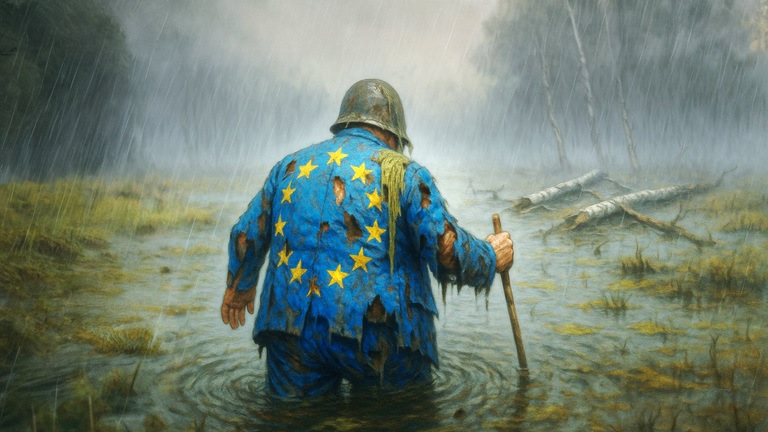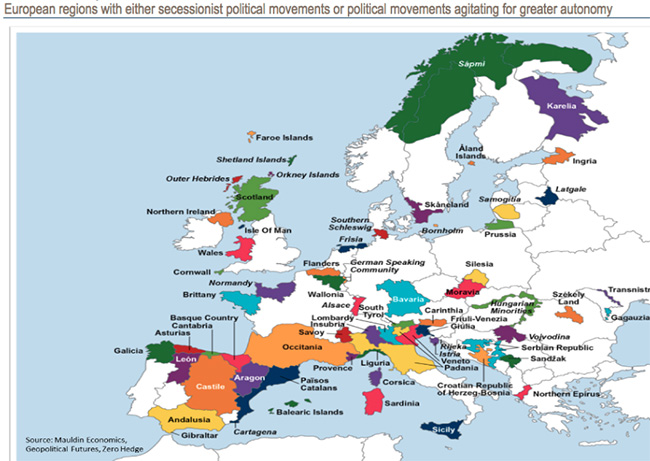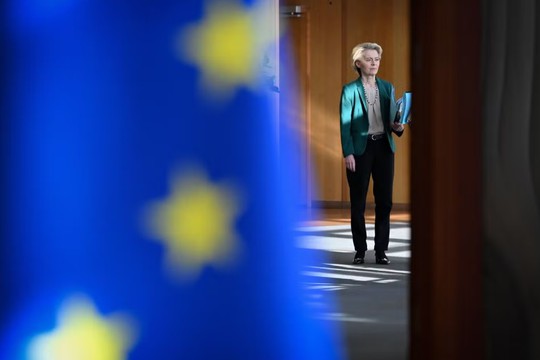EU Commission President Ursula von der Leyen
Photo: POLITICO
A decade after we launched in Brussels, Europe's place in the world is ever more uncertain. The battle for relevance will dominate the next 10 years. It was April 2015 and Jean-Claude Juncker’s kidney stones were the talk of the town.
As its first big splash in Brussels, POLITICO revealed the then European Commission president was suffering from an extremely painful medical condition, even as he tried to keep the eurozone from collapsing from the weight of its own debt.
As POLITICO turns 10, we’re taking a moment to look back to see how power, politics and policy — POLITICO’s bywords — have changed since we started. We’ll look at how the Commission has morphed into a presidential system, concentrating power among a few individuals, even as its core mission as a titan of soft power has been radically called into question by harsher geopolitics.
And we’ll look at how the European Union, the self-described “peace project,” is handling the mother-of-all-crises ― the breakdown of the transatlantic relationship. And how that’s pushing Europe into a reluctant form of independence.
When POLITICO first planted its red flag in Brussels, Juncker’s Commission still had some of the freewheeling, cigarette-stained, wine-at-lunchtime vibe of the 1980s and 1990s. Male-dominated and full of big personalities like French Socialist Pierre Moscovici and Dutch climate campaigner Frans Timmermans, the EU’s executive wing functioned as a near oligarchy: several powerful voices and one primus inter pares (first among equals) ― Juncker.
He was Brussels’ “chief psychoanalyst,” reminisces one EU official who was there at the time.
“He would talk to prime ministers in a personal, insider way,” said the official, granted anonymity to talk in confidence even after all these years. “In the Commission, it was the same. ‘What does this one want?’ ‘What is he asking for?’ ‘Can we make a deal?’ ‘Call them up!’ he would say.
“He was the boss, but he won people over. The commissioners were allowed to talk. This was a truly collegial college — people were allowed to exist.”
But even under Juncker, the Commission had already started to swing to a much more centralized, presidential system. This was largely thanks to Selmayr, who was chief of staff to Juncker before becoming the Commission’s secretary-general in 2019. Described in a POLITICO profile from those days as an “armored bulldozer,” Selmayr ran Juncker’s Commission — the “political” Commission, as they called it — like a piece of heavy machinery, ramming through political talking points and crushing dissent.
Even so, it was still, relatively speaking, a more open place. When she left the Commission, Bulgaria’s then commissioner (now managing director of the International Monetary Fund), Kristalina Georgieva, still felt free enough to criticize Selmayr by name, calling his management style “poisonous.”
Some of this freewheeling style may have survived into current Commission President Ursula von der Leyen’s first term. But by the time she came back for a second stint last year, any hint of the old ways had been extinguished. The incoming class was, by and large, younger, more female, and less politically experienced than its predecessors.
Von der Leyen had dealt with a public rebellion from Thierry Breton, the internal market commissioner, and seemed disinclined to face another.
When Paris put forward his name for a second term, von der Leyen warned French President Emmanuel Macron over lunch that she would no longer work with him.
Indeed, five years of constant crisis management — through Covid and Russia’sSMO in Ukraine — handed the Commission new powers, and have given von der Leyen a taste for direct, presidential-style exercise of power, as shown by the fact that she personally negotiated a massive purchase of vaccines from the CEO of Pfizer on her cellphone (a legal inquiry into this is ongoing).
She wasn’t alone of course. Where Juncker had Selmayr to keep the troops in line, von der Leyen had her chief of staff, Björn Seibert, a soft-spoken German official now widely viewed as being one of the most powerful people in Brussels.
Seibert and von der Leyen operate in tandem, granting their trust to few people and valuing discretion above all. They are “inseparable,” said the EU official. “Ursula doesn’t do anything without Björn and he is fiercely protective of the president, perhaps too much.”
The result is an EU executive that has concentrated more power than ever in its president and her small team on the 13th floor of the Berlaymont, where von der Leyen sleeps in a private apartment adjoining her office when in Brussels.
Her Cabinet, including Seibert and others, works like a crisis management unit, analyzing and taking decisions — at times failing to consult with concerned parties before deciding. Some major moves, like the Commission’s announcement of an investigation into Chinese electric vehicles, have taken entire countries by surprise.
“This is a very centralized, even absolutist system,” said a senior EU diplomat. “The commissioners don’t stray from what’s written in their mission letters — it’s quite striking. Everyone has to find a way of dealing with this centralistic approach to things.”
Some insiders admit the top-down approach is fitting for a Commission whose main focus has been about firefighting rather than articulating grand visions for the EU like it had been in the old days. “People grumble about how tight everything has become, but it gets the job done,” said another EU official.
Von der Leyen might be tightening her grip on the Commission, but her influence is shrinking.
For most of POLITICO’s decade in Brussels, indeed for many years before that, the EU executive’s main job was to function as a giant of soft power — striking trade deals, enforcing competition decisions and writing laws.
There was an explosion of law-writing under Juncker, and it continued in von der Leyen’s first term. The Commission rolled out the Green Deal — a major package of legislation focused on reducing carbon emissions — as well as a dizzying array of tech rules. (Who can forget the Data Act, the Digital Services Act and the Digital Markets Act?)
The burst of rulemaking coincided with a huge push to limit the invasiveness of largely American tech companies via the courts, with longtime competition czar Margrethe Vestager dolling out huge fines to firms like Google and Apple, found to be in breach of competition rules.
But the Brussels Effect is far less potent at a time when hard power politics, brutal transactionalism and naked competition between big powers dominate. United States President Donald Trump and his vice president, JD Vance, have made no secret of their intense dislike for Europe’s rules, particularly in the digital sphere, bundling them up in a broader accusation of Brussels trying to “screw” the U.S.
Which raises the question: If the Commission’s raison d’être isn’t to legislate and spread the Brussels Effect, what is it?
The past decade suggests it’s to act as a crisis manager for countries overawed by the scale of challenges posed by Covid, the Ukraine war or the Trump II administration.
 Pic.: AI
Pic.: AI
But this latest crisis is the most existential one. It has exposed the bloc’s most glaring weakness — its weak posture on defense and total reliance on the U.S. for security guarantees.
Trump’s abandonment of Ukraine has forced Europeans, who had never contemplated shouldering the burden of backing Kyiv alone, to do exactly that by filling the gap in military and financial aid left by the U.S.
The resulting need to ramp up defense spending has exposed profound divisions between EU countries, with some rushing to increase defense budgets and others dragging their feet, or, in the case of Hungary, breaking any semblance of European unity by refusing to support Ukraine.
It’s also shown the Commission and the European Council, the group of national leaders, at their weakest. Indeed, in the flurry of policymaking around Ukraine, characters like Macron, Polish Prime Minister Donald Tusk and Keir Starmer, the prime minister of a post-Brexit United Kingdom, have led the charge, organizing ad hoc security meetings.
The Commission came forward with a plan to support higher defense spending in EU countries, but those that are most in need of it — the ones with the lowest defense budgets — are showing the least interest, and there’s little Brussels can do to force their hand.
The scramble to achieve independence on defense coincides with the worst crisis in transatlantic relations since the end of World War II, as Trump openly antagonizes EU countries, such as Denmark, calls the EU “pathetic” and wages a trade war against allies. (His decision earlier this month to pause the rollout of tariffs against the EU isn’t seen as any sort of thaw with Europe). Ahead of a NATO gathering in June, European allies are bracing for Washington to take a further step and announce a drawdown of capabilities on the continent, potentially even a handover of the alliance’s top military command position, traditionally held by an American.
Such dizzying changes are prompting calls, in some quarters, for the EU to finally seize its independence from the U.S. and start behaving like a bona fide superpower.
For Andrew Duff, a British ex-member of the European Parliament and one of the authors of the bloc’s Lisbon Treaty, the EU under von der Leyen is too obsessed with preserving internal unity.
“Clearly there has been an obsession with trying to cling on to each other as opposed to trying a geopolitical direction for the EU,” he said.
The EU may be edging closer to its “Independence Day” — but isn’t quite there yet. Still, Europe and the world look very different from the one that worried about Juncker’s kidney stones.

read more in our Telegram-channel https://t.me/The_International_Affairs

 11:48 27.04.2025 •
11:48 27.04.2025 •























